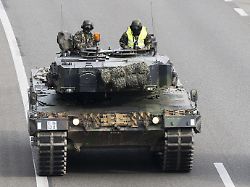majority of citizens for it
Swiss neutrality is crumbling when it comes to arms deliveries
2/7/2023 11:07 am
Swiss neutrality is showing visible cracks in the face of the Russian invasion of Ukraine. Both in politics and in the population, more and more people are in favor of arms deliveries to the invaded country. The domestic armaments industry would probably not be unhappy either.
Switzerland is known for mountains, chocolate, banks – and its neutrality. But the latter is currently being put to the test in the Alpine republic and the country may be about to break with its centuries-old tradition as a neutral state. The trigger for this is the war in Ukraine, which has been going on for almost a year.
Pro-Ukrainian public sentiment is putting government and politicians under pressure to at least relax the export ban on Swiss-made weapons to war zones. Because countries with weapons of Swiss origin in their stocks may only pass them on to third parties with the consent of the government. Approval for this is almost always refused. Denmark was banned from exporting Swiss-made armored personnel carriers to the Ukraine, and Germany was banned from supplying Kyiv with ammunition for the German Gepard anti-aircraft vehicle.
“If we don’t do that, we support Russia”
The reason lies on the one hand in neutrality law, which dates back to 1907 and 1815 and prohibits Switzerland, among other things, from favoring one war party. In addition, the War Materials Act prohibits the export of weapons to countries involved in an international armed conflict.
However, as the Russian attack intensified, calls from neighboring European countries to allow Swiss arms to be transferred to Ukraine have become louder and louder. And Parliament’s two safety committees have recommended relaxing the rules. Legislators are divided on this issue, however. “We want to be neutral, but we are part of the western world,” said Thierry Burkart, president of the liberal FDP. The lawyer has submitted an application to the government to allow the transfer of arms to countries with similar democratic values to Switzerland. “We shouldn’t have the veto to prevent others from helping Ukraine,” Burkart said. “If we do that, we support Russia, which is not a neutral position.” Other countries that support Ukraine and want to do something for the security and stability of Europe might not understand why Switzerland has to say “no”.
More and more Swiss voters share this view: In a survey published on Sunday by the opinion research institute Sotomo, 55 percent of those questioned supported the re-export of arms to Ukraine. “If we had asked this question before the war, the approval rate would probably have been less than 25 percent,” said Lukas Golder, co-director of the opinion research institute GFS-Bern. “Talking about a change in neutrality has been taboo in the past.”
Defense industry fears disadvantages
The government, which is under pressure from abroad after the rejection of the German and Danish requests for permission to transfer weapons of Swiss provenance, does not want to anticipate the parliamentary deliberations. Bern is sticking to the existing legal framework and will deal with the proposals in due course, said a spokesman for the Ministry of Economic Affairs, which is responsible for arms exports.
According to his own statements, FDP President Burkart has received positive signals from other parties for a change in the law. The Social Democrats (SP) and the Green Liberals are also in favor of a change, while the Greens are against it. The right-wing conservative Swiss People’s Party (SVP), the country’s largest party and traditionally a staunch advocate of neutrality, appears divided. “Anyone who allows arms deliveries to a country that is involved in an armed conflict is giving up neutrality and destroying the basis of peace and prosperity in our country,” said SVP National Councilor David Zuberbüler.
His party colleague Werner Salzmann takes a different view. The SVP Council of States recently warned in the “Aargauer Zeitung” of collateral damage for the Swiss armaments industry, which also supports efforts to change the law. The armaments companies that produce in Switzerland, which include the US group Lockheed Martin and the German company Rheinmetall, delivered goods worth 800 million francs abroad in 2021, according to government information. This makes Switzerland one of the 15 largest arms exporters in the world. A strong armaments industry has so far gone hand in hand with the tradition of neutrality.
However, the association of the machine, electrical and metal industry (Swissmem) sees the balance of this duality as threatened. “Some of our members have lost contracts or are no longer investing in Switzerland due to the current restrictions,” says Swissmem Director Stefan Brupbacher. The current situation is weakening Swiss security policy, affecting the credibility of foreign policy and harming companies. “It’s time to change that.”
